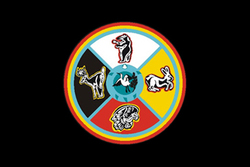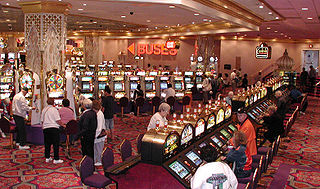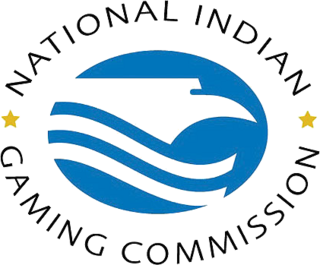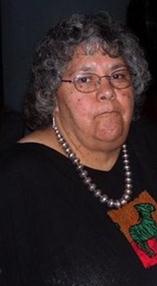Related Research Articles

Native American gaming comprises casinos, bingo halls, and other gambling operations on Indian reservations or other tribal lands in the United States. Because these areas have tribal sovereignty, states have limited ability to forbid gambling there, as codified by the Indian Gaming Regulatory Act of 1988. As of 2011, there were 460 gambling operations run by 240 tribes, with a total annual revenue of $27 billion.

The Sac and Fox Nation is the largest of three federally recognized tribes of Sauk and Meskwaki (Fox) Indian peoples. Originally from the Lake Huron and Lake Michigan area, they were forcibly relocated to Oklahoma in the 1870s and are predominantly Sauk. The "Sac and Fox OTSA" is the land area in Oklahoma governed by the tribe.
Online casinos, also known as virtual casinos or Internet casinos, are online versions of traditional casinos. Online casinos enable gamblers to play and wager on casino games through the Internet. It is a prolific form of online gambling.

The Native Hawaiian Government Reorganization Act of 2009 S1011/HR2314 was a bill before the 111th Congress. It is commonly known as the Akaka Bill after Senator Daniel Akaka of Hawaii, who proposed various forms of this bill after 2000.

The Alabama or Alibamu are a Southeastern culture people of Native Americans, originally from Alabama. They were members of the Muscogee Creek Confederacy, a loose trade and military organization of autonomous towns; their home lands were on the upper Alabama River.

The Sault Ste. Marie Tribe of Chippewa Indians, commonly shortened to Sault Tribe of Chippewa Indians or the more colloquial Soo Tribe, is a federally recognized Native American tribe in what is now known as Michigan's Upper Peninsula. The tribal headquarters is located within Sault Ste. Marie, the major city in the region, which is located on the St. Marys River.
The Jack Abramoff Indian lobbying scandal was a United States political scandal exposed in 2005; it related to fraud perpetrated by political lobbyists Jack Abramoff, Ralph E. Reed Jr., Grover Norquist and Michael Scanlon on Native American tribes who were seeking to develop casino gambling on their reservations. The lobbyists charged the tribes an estimated $85 million in fees. Abramoff and Scanlon grossly overbilled their clients, secretly splitting the multi-million dollar profits. In one case, they secretly orchestrated lobbying against their own clients in order to force them to pay for lobbying services.

The Rosebud Indian Reservation is an Indian reservation in South Dakota, United States. It is the home of the federally recognized Rosebud Sioux Tribe, who are Sicangu, a band of Lakota people. The Lakota name Sicangu Oyate translates as the "Burnt Thigh Nation", also known by the French term, the Brulé Sioux.

The Indian Gaming Regulatory Act is a 1988 United States federal law that establishes the jurisdictional framework that governs Indian gaming. There was no federal gaming structure before this act. The stated purposes of the act include providing a legislative basis for the operation/regulation of Indian gaming, protecting gaming as a means of generating revenue for the tribes, encouraging economic development of these tribes, and protecting the enterprises from negative influences. The law established the National Indian Gaming Commission and gave it a regulatory mandate. The law also delegated new authority to the U.S. Department of the Interior and created new federal offenses, giving the U.S. Department of Justice authority to prosecute them.

In the United States, gambling is subject to a variety of legal restrictions. In 2008, gambling activities generated gross revenues of $92.27 billion in the United States.

The National Indian Gaming Commission is a United States federal regulatory agency within the Department of the Interior. Congress established the agency pursuant to the Indian Gaming Regulatory Act in 1988.

Pokagon Band of Potawatomi Indians are a federally recognized Potawatomi-speaking tribe based in southwestern Michigan and northeastern Indiana. Tribal government functions are located in Dowagiac, Michigan. They occupy reservation lands in a total of ten counties in the area.
The impact of Native American gaming depends on the tribe and its location. In the 1970s, various tribes took unprecedented action to initiate gaming enterprises. In this revitalization of the Native American economy, they created a series of legal struggles between the federal, state, and tribal governments. Gaming has stimulated tribal economies by providing jobs and generating revenue but has also been controversial through its threat to tribal sovereignty, disputes over the negative impact of gaming, and a loss of Native American culture. The Indian Gaming Regulatory Act was passed in 1988 to secure collaboration between the states and tribes and also for the federal government to oversee gaming operations.
Carcieri v. Salazar, 555 U.S. 379 (2009), was a case in which the Supreme Court of the United States held that the federal government could not take land into trust that was acquired by the Narragansett Tribe in the late 20th century, as it was not federally recognized until 1983. While well documented in historic records and surviving as a community, the tribe was largely dispossessed of its lands while under guardianship by the state of Rhode Island before suing in the 20th century.

The Connecticut Indian Land Claims Settlement was an Indian Land Claims Settlement passed by the United States Congress in 1983. The settlement act ended a lawsuit by the Mashantucket Pequot Tribe to recover 800 acres of their 1666 reservation in Ledyard, Connecticut. The state sold this property in 1855 without gaining ratification by the Senate. In a federal land claims suit, the Mashantucket Pequot charged that the sale was in violation of the Nonintercourse Act that regulates commerce between Native Americans and non-Indians.

Pearl Casias is a member of the Southern Ute Indian Tribal Council and former Tribal Judge. In 2011, she was elected to be the first female Chairperson of the Southern Ute Tribal Council.
The Koi Nation of the Lower Lake Rancheria is a federally recognized tribe of Southeastern Pomo people in northern California. Their name for their tribe is Koi Nation of Northern California, from their traditional village, Koi, once located on an island in Clear Lake.
The Kickapoo Tribe of Indians of the Kickapoo Reservation in Kansas is one of three Federally recognized tribes of Kickapoo people. The other Kickapoo tribes in the United States are the Kickapoo Traditional Tribe of Texas and the Kickapoo Tribe of Oklahoma. The Tribu Kikapú are a distinct subgroup of the Oklahoma Kickapoo and reside on a hacienda near Múzquiz Coahuila, Mexico; they also have a small band located in the Mexican states of Sonora and Durango.

The Michigan Gaming Control Board (MGCB) is a gaming control board in Michigan that provides oversight of the state's gaming industry, which was founded and authorized by statewide voting in November 1996.
The National Indian Gaming Association (NIGA) is a nonprofit organization founded in 1985 made up of 184 Indian Nations in the United States, with additional nonvoting associate members. The purpose of the NIGA is "to protect and preserve the general welfare of tribes striving for self-sufficiency through gaming enterprises in Indian country," and to "maintain and protect Indian sovereign governmental authority in Indian Country."
References
- 1 2 3 4 Kimball, Nancy. "Tribal Focus Underlies Firm's Mission". The Daily Interlake.[ dead link ]
- ↑ Rosen, Cheryl (June 2007). "Place A Bet On Gaming". Journal of Accountancy.
- Lawrence, Bill (2001). "White Earth Casino Audits Made Public". The Ojibwe News. Archived from the original on 2013-06-01. - ↑ "Montana-based firm JOSEPH EVE joins Wipfli". www.wipfli.com. Retrieved 2018-10-24.
- ↑ Jones, Michael. "Congress Holds Online Gaming, Poker Hearing".
- "The Future Of Internet Gaming". Hearing Before the United States Senate Committee on Indian Affairs 112th Congress First Session. 17 November 2007.
- Stradbrooke, Steven (18 November 2011). "Senate Indian Affairs Committee Hears Tribal Concerns Over Tribal Gaming". Calvin Ayre Foundation.
- "Indian Affairs Hearing Reveals Tribes Oppose Barton Bill and Split on Legalization". COMPNCARDS. - ↑ "Oversight Hearingon the Future of Internet Gaming: What's at Stake for Tribes" . Retrieved September 12, 2012.
- Akaka, Daniel. "Indian Affairs Oversight Hearing On Indian Gaming". United States Senate Committee on Indian Affairs. - ↑ "National Indian Gaming Association 2011 report" (PDF). National Indian Gaming Association. Mohegan Sun. 2011.
- ↑ "Joseph Eve Launches Tribal Internet Gaming Consulting Group" (PDF). Indian Gaming. May 2011.
- "Joseph Eve Launches Tribal Financing And Accounting Outsourcing Practice" (PDF). Indian Gaming. April 2011. - ↑ Abernathy, Jason. "Rosebud Sioux Gaming Keeps On Turning". Native Sun News.
- Richardson, Ehren (April 2011). "US Indicts Poker Website Operators And Creates Opportunities For Tribal Gaming" (PDF). IGaming Business Magazine.
- "Igaming Regulation In Canada". Canadian Gaming Business. - ↑ "Tribal Leaders Continue Internet Gaming Dialogue at Mystic Lake Casino". Indian Gaming Weekly. August 22, 2012.
- Red-Horse, Valerie (July 2012). "Internet Gaming Explored At Great Plains conference". Casino Enterprise Magazine.
- "16th Annual Oklahoma Indian Gaming Association" (PDF). Oklahoma Indian Gaming Association.
- Whitley, John (May 2007). "In Depth: Profits Give Tribes Political, Financial Power". Casino City Times. - ↑ Larcombe, James E. "Focus on tribal clients helps expansion". Great Falls Tribune.
- ↑ Red Horse, Valerie (2 July 2012). "Internet Gaming Explored at Great Plains Conference". Casino Enterprise Management. Retrieved 8 November 2012.
- ↑ "NEWave Brings Award-Winning Software Solutions to Southern Gaming Summit/Bingo World". Marketwire.[ dead link ]